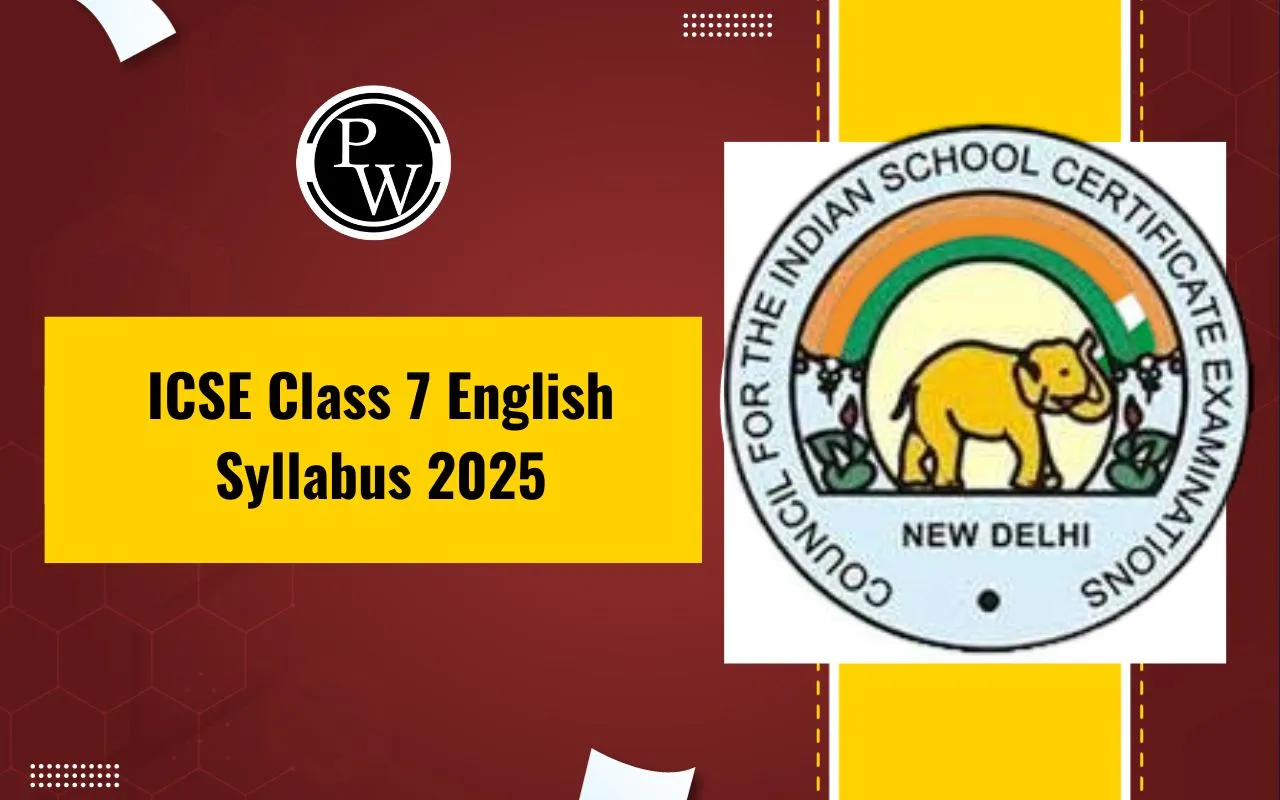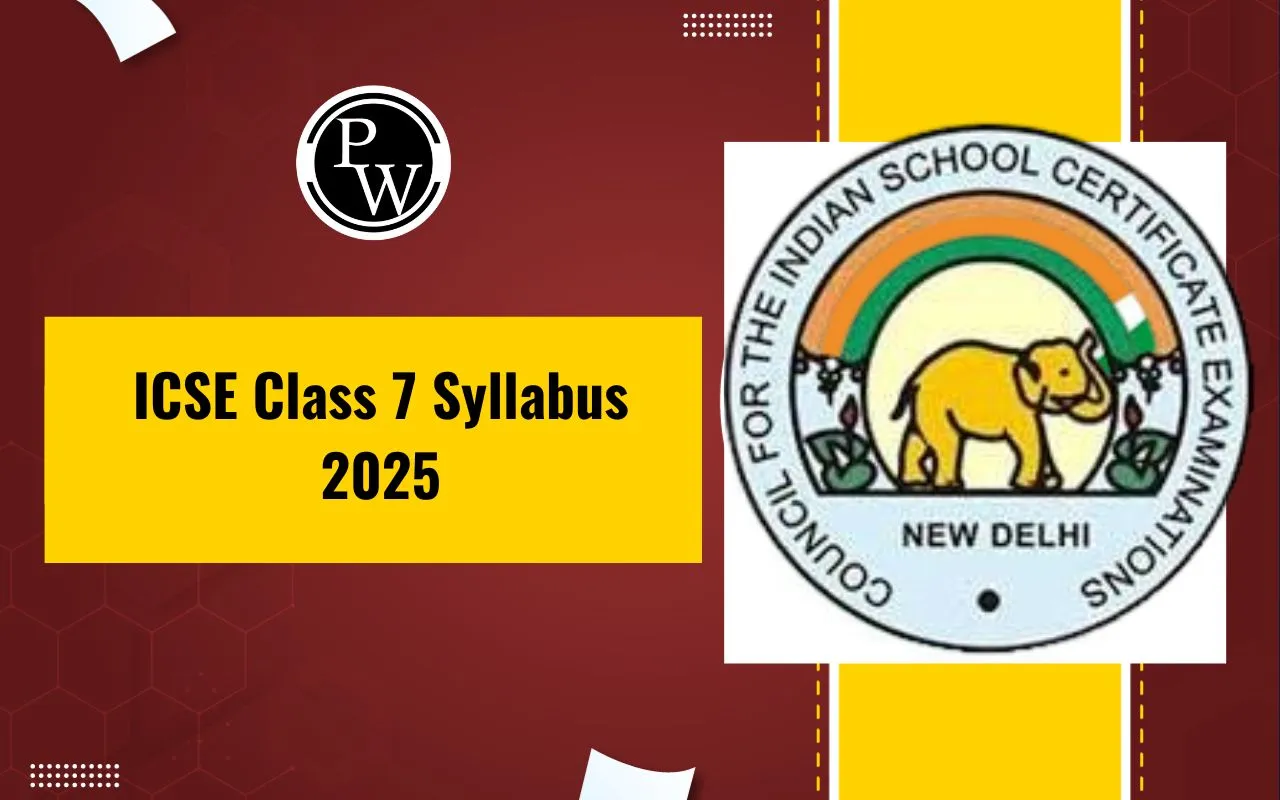
ICSE Class 7 syllabus for the academic year 2025-26, designed by the Council for the Indian School Certificate Examinations (CISCE), aims to strengthen the academic foundation of students in key subjects like English, Mathematics, Science, History, Civics and Geography.The syllabus focuses on building core concepts, critical thinking, communication, and problem-solving abilities through a structured and holistic curriculum.
Class 7 is a transition from the basics of middle school to more detailed and subject-specific learning, preparing students for the rigor of Class 8 and beyond.
ICSE Class 7 Syllabus 2025-26
ICSE Class 7 syllabus includes all the main subjects students need at this level. It helps them revise what they already know and slowly introduces new and slightly more advanced topics. Each subject is designed to improve understanding, boost confidence, and prepare students for the next class.
Below is a subject-wise list to help students and parents plan their studies in a simple and organized way.
|
ICSE Class 7 Syllabus |
|
ICSE Class 7 Maths Syllabus |
|
ICSE Class 7 English Syllabus |
|
ICSE Class 7 Science Syllabus |
|
ICSE Class 7 Social Science Syllabus |
ICSE Class 7 Syllabus 2025-26 Subject-wise Overview
Here is a breakdown of the major subjects covered in Class 7 under the ICSE curriculum:
ICSE Class 7 English Syllabus
The English syllabus emphasizes reading, writing, grammar, and vocabulary development.
-
Nouns – Types, number, gender, and usage
-
Pronouns – Kinds and correct use in sentences
-
Articles – Definite and indefinite article
-
Adjectives – Degrees, types, and comparison
-
Verbs – Main verbs, helping verbs, and usage
-
Adverbs – Types and their placement in sentences
-
Verbs: Future Tense – Structure and use
-
Verbs: Past Tense – Rules and usage
-
Verbs: Future Tense – (Repeated; may be an error—can be edited or replaced)
-
Verbs: Perfect Tense – Present, past, and future perfect
-
Finite and Non-Finite Verbs – Identification and usage
-
Modals – Can, could, may, might, must, shall, should, etc.
-
Active and Passive Voice – Converting and understanding voice
-
Prepositions – Types and correct usage
-
Conjunctions – Coordinating, subordinating, and correlative
-
The Sentence – Structure and kinds of sentences
-
Phrases and Clauses – Types and functions in a sentence
-
Sentence Types – Declarative, interrogative, imperative, exclamatory
-
Direct and Indirect Speech – Reported speech rules
-
Punctuations – Use of commas, full stops, apostrophes, quotation marks, etc.
-
Phrasal Verbs and Idioms – Commonly used expressions
-
Vocabulary – Synonyms, antonyms, word meanings, usage
-
Comprehension – Reading passages with questions
-
Composition – Paragraph writing, essays, letters, story writing, notices
ICSE Class 7 Mathematics Syllabus
The Class 7 Maths syllabus covers both numerical and geometrical concepts to promote analytical thinking.
-
Integers – Understanding positive and negative numbers and their operations
-
Rational Numbers – Concepts of numerator, denominator, and rational number operations
-
Fractions – Types of fractions, simplification, and operations
-
Decimals / Decimal Fractions – Conversions, addition, subtraction, multiplication, and division
-
Exponents – Laws of exponents and powers
-
Set Concepts – Introduction to sets, types, and representation
-
Ratio & Proportion – Comparing quantities and solving real-life problems
-
Unitary Method – Solving problems based on one-unit values
-
Percent and Percentage – Finding percentages, increase/decrease, and applications
-
Profit, Loss and Discount – Solving problems based on commercial mathematics
-
Simple Interest – Calculating interest using the basic formula
-
Speed, Time and Distance – Basic concepts with application problems
-
Fundamental Concepts – Introduction to basic arithmetic operations and patterns
-
Simple Linear Equations – Solving one-variable equations
-
Inequalities – Understanding and solving mathematical inequalities
-
Lines and Angles – Types of lines, angles, and properties
-
Triangles – Classification, properties, and basic construction
-
Pythagoras Theorem – Understanding and applying the theorem in right triangles
-
Symmetry – Identifying lines of symmetry in different shapes
-
Recognition of Solids – Basic solid figures and their properties
-
Congruency: Congruent Triangles – Understanding congruent shapes and triangle criteria
-
Constructions – Using compass and ruler to draw angles and shapes
-
Mensuration – Calculating area, perimeter, and volume of various figures
-
Data Handling – Collecting, organizing, and representing data using charts and graphs
-
Probability – Basic concept of chance and simple probability problems
ICSE Class 7 Science Syllabus
Science is divided into Physics, Chemistry, and Biology, each subject focusing on real-world applications and hands-on learning.
Physics
-
Physical Quantities and Measurement – Introduction to physical quantities, SI units, and how to measure length, mass, and time
-
Motion and Time – Types of motion, speed, and time measurement
-
Energy – Different forms of energy, conversion, and conservation
-
Light Energy – Reflection, mirrors, and properties of light
-
Heat – Effects of heat, expansion, and measurement of temperature
-
Sound – Nature of sound, vibrations, and how sound travels
-
Electricity and Magnetism – Basics of electric circuits, magnets, and magnetic effects
Chemistry
-
Matter and Its Composition – States of matter and their properties
-
Physical and Chemical Changes – Difference between physical and chemical changes with examples
-
Elements, Compounds and Mixtures – Basic understanding of pure substances and mixtures
-
Atomic Structure – Atoms, molecules, and structure of an atom
-
Language of Chemistry – Symbols, chemical formulas, and equations
-
Metals and Non-Metals – Properties and uses of metals and non-metals
-
Air and Atmosphere – Composition of air, importance of oxygen, nitrogen, and carbon dioxide
Biology
-
Plant and Animal Tissues – Types and functions of tissues in plants and animals
-
Classification of Plants – Grouping of plants based on their features
-
Classification of Animals – Vertebrates and invertebrates, their characteristics
-
Photosynthesis and Respiration – Process of food making in plants and breathing in animals
-
Excretion in Humans – Organs and process of removing waste from the body
-
Nervous System – Structure and functions of the brain, spinal cord, and nerves
-
Allergy – Common allergens, causes, symptoms, and basic precautions
ICSE Class 7 History and Civics Syllabus
History in Class 7 focuses on ancient to medieval India, including dynasties and religious movements. Civics introduces students to the Constitution and governance.
History
-
The Advent of Christianity – Origin and spread of Christianity
-
Islam and Its Impact on the Middle East – Rise of Islam and its influence
-
The Turkish Invasion – Effects of early invasions on Indian history
-
The Delhi Sultanate: The Slave Dynasty – Foundation of the Sultanate
-
The Khalji Dynasty – Expansion and policies
-
The Tughluq, Sayyid, and Lodi Dynasties – Changes in rule and administration
-
Delhi Sultanate: Administration, Religion, and Architecture – Features of governance and culture
-
The Vijayanagara and the Bahmani Kingdoms – Southern kingdoms and their contributions
-
The Rise of the Mughal Empire – Beginning of Mughal rule in India
-
Akbar – His rule, policies, and administration
-
Jahangir and Shah Jahan – Their reigns and contributions to art and architecture
-
Aurangzeb – Expansion and end of the Mughal Empire
-
Bhakti and Sufi Movements – Religious and cultural movements that promoted unity and devotion
Civics
-
The Constitution – Importance, features, and values of the Indian Constitution
-
Directive Principles of State Policy – Goals for the government and public welfare
Geography
-
Understanding Geography – Maps and Mapping – Basics of maps, symbols, and directions
-
Global Warming – Causes, effects, and ways to reduce it
-
Atmospheric Pressure – Understanding pressure and its effect on weather
-
Weather and Climate – Difference, factors affecting both
-
Soil and Weathering – Types of soil and how rocks break down
-
Industries – Types, importance, and impact of industries
-
Energy and Power Resources – Renewable and non-renewable resources
-
Europe – Resources – Natural resources and their use
-
Europe – Political Division and Demography – Countries, population, and political map
-
Africa – Resources – Major resources and economic activities
-
Africa – Political Division and Demography – Nations, population, and geography
-
Australia – Resources – Key resources and industries
-
Australia – Political Division and Demography – States, population, and map work
How to Prepare for ICSE Class 7 Exams Using the Syllabus
Preparing for ICSE Class 7 exams becomes easier when students follow a clear plan based on the current syllabus. Understanding what to study and how to study each subject helps in managing time and learning more effectively.
Below is a subject-wise guide with helpful tips and key areas to focus on. This will support students in improving their understanding, building strong study habits, and doing well in their exams with confidence.
|
How to Prepare for ICSE Class 7 Exams Using the Syllabus |
||
|
Subject |
Key Focus Areas |
|
|
English |
Grammar, Writing Skills, Reading Comprehension |
Practice writing regularly, read literature, revise grammar concepts |
|
Mathematics |
Fractions, Percentages, Geometry, Word Problems |
Solve exercises daily, work on weak areas, practice sample questions |
|
Science |
Physics (Energy, Light), Bio (Tissues, Excretion), Chem (Atoms, Matter) |
Draw diagrams, do experiments, watch concept-based videos |
|
History |
Dynasties, Important Kings, Religious Movements |
Use timelines, make summary notes, use flashcards |
|
Civics |
Constitution, State Policy |
Relate to current events, understand key terms clearly |
|
Geography |
Maps, Resources, Continent Study |
Practice map skills, watch documentaries, make charts |
|
Second Language |
Grammar, Essay Writing, Vocabulary |
Read daily, write short passages, revise rules |
Benefits of Studying the ICSE Class 7 Syllabus
-
Builds a strong base for higher classes (8, 9, and 10).
-
Develops clear understanding in core subjects.
-
Promotes creativity, reasoning, and independent thinking.
-
Balances academic and practical knowledge.
-
Improves communication skills in English and second languages.
-
Encourages project-based and real-world learning.
-
Helps students prepare better for school-level and competitive exams.
ICSE Class 7 Syllabus 2025 FAQs
Who sets the ICSE Class 7 syllabus?
Is the ICSE Class 7 syllabus the same as NCERT?
Where can I get the official ICSE Class 7 syllabus?
Are projects and assignments included in the syllabus?



